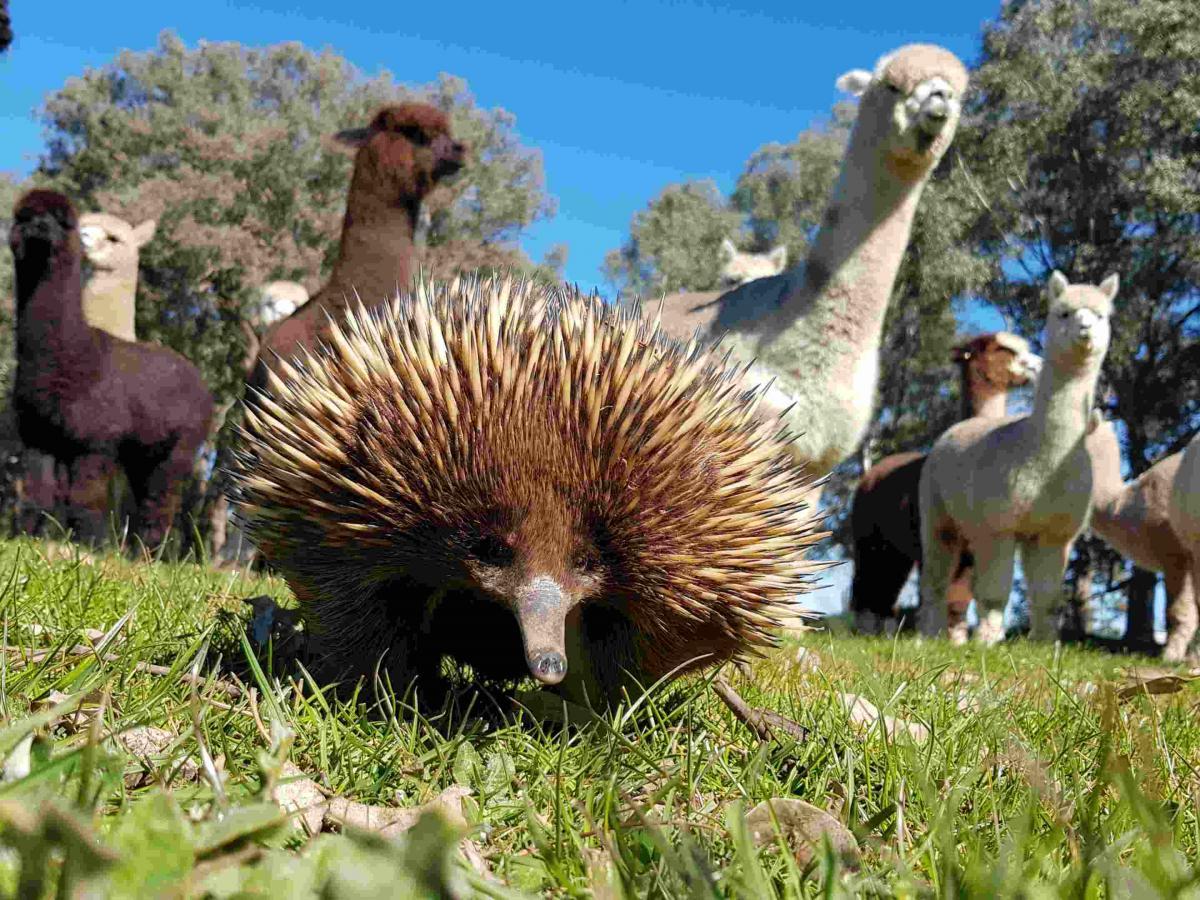Echidna conservation science initiative a finalist in Eureka Awards

Echidna spotted hanging out with a bunch of alpacas. Image credit: EchidnaCSI
The University of Adelaide’s Echidna Conservation Science Initiative (EchidnaCSI) is a finalist in the Australian Museum’s 2021 Eureka Prizes.
EchidnaCSI is a citizen science project where members of the public across Australia are encouraged to take photos of echidnas found in their local area through a dedicated phone app, and collect echidna scat (poo) for molecular analysis of their diet and gastric health.
Dr Tahlia Perry from the University of Adelaide’s School of Biological Sciences and the Environment Institute said, “The aim of the project is to learn about the current distribution of echidnas across Australia, including their recovery in areas impacted by environmental events such as bushfire and flood.”
Analyses of echidna scat from all major habitats reveals new information about the diet, health, reproduction and genetic diversity of echidnas in different parts of the country. All of which assist in conservation efforts for the much loved Aussie icon.
“This project is making quantum steps in science information gathering, education and community connectivity through practical engagement. It is creating unique opportunities for fundamental advancements in conservation management for the unique and iconic echidna. "Dr Peggy Rismiller OAM
Alongside Dr Perry, the EchidnaCSI team includes University of Adelaide’s Professor Frank Grutzner, who has worked on genetics in platypuses and echidnas for almost two decades, and undergraduate student Isabella Wilson.
They are joined by Dr Peggy Rismiller OAM, the world-leading echidna ecologist at the Pelican Lagoon Research and Wildlife Centre. Her long-term field work with echidnas, spanning more than three decades, led to the listing of the Kangaroo Island echidna as endangered.
“It’s a real coming together of expertise in echidna biology, ecology and genetics, and those of the general public with a passion for conservation of our amazing wildlife,” Dr Perry said.
“The project has been a remarkable success. Since it began in September 2017, the Australian community has recorded more than 11,000 sightings and collected more than 600 scat samples for analysis.”
This number of sightings with photographic evidence and scat samples has never been achieved before, and provides a constantly growing data and material base that supports ongoing research into fundamental questions about echidna distribution, diet and gut health, which is vital for conservation of echidnas.
The project has also revealed that echidnas are surprisingly common in urban areas.
“We are receiving submissions of echidna sightings from within or surrounding all major cities in Australia, some are finding them in their own backyards, which means you don’t even need to be an avid bushwalker to potentially spot an echidna and participate in EchidnaCSI,” Dr Perry said.
Professor Grutzner said, “Citizen science projects, such as EchidnaCSI, have enormous potential for research in particular in conservation efforts, by providing scientists with invaluable information about the numbers, location and health of precious native wildlife.”
Dr Rismiller OAM said, “This project is making quantum steps in science information gathering, education and community connectivity through practical engagement. It is creating unique opportunities for fundamental advancements in conservation management for the unique and iconic echidna.
“The EchidnaCSI team has developed a remarkable network of communication and data collection that was only dreamt of 30 years ago. I am honoured and proud to be part of the team that has brought the EchidnaCSI vision together.” said Dr Rismiller OAM.
The Eureka Prizes offer $160,000 in prize money, across a broad spectrum of research from environmental to innovative technologies, defence and mentoring.
EchidnaCSI is a finalist in the Engagement category for the Department of Industry, Science, Energy and Resources Eureka Prize for Innovation in Citizen Science.
The AM Eureka Prizes winners will be announced on Thursday 7 October 2021 at a live broadcast event.
